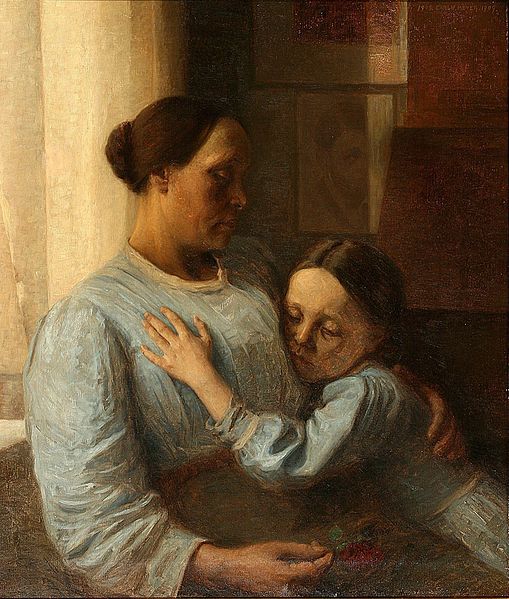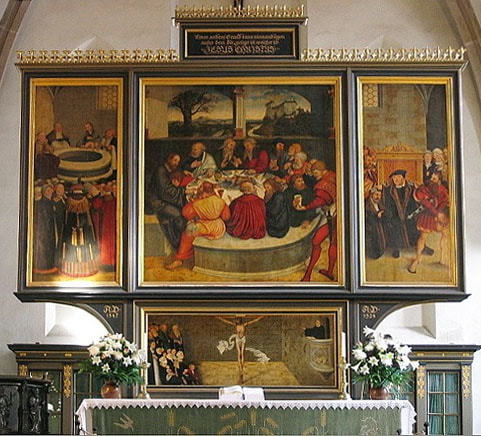Psalm 133
Romans 15:1-7
Matthew 18:15-35
March 24, 2021
Last week we learned about the Office of the Keys, which is that special authority, which Christ has given to his church on earth to forgive the sins of repentant sinners, but to withhold forgiveness from the unrepentant as long as they do not repent. And in your Small Catechism it says, “I believe that when the called ministers of Christ deal with us by His divine command, in particular when they exclude openly unrepentant sinners from the Christian congregation and absolve those who repent of their sins and want to do better, this is just as valid and certain, even in heaven, as if Christ our dear Lord dealt with us Himself.” Yet, this is not to be misunderstood to mean that the minister alone holds the power to forgive sins. Rather, Christ has given this authority to his entire Church and every individual Christian has the authority and power to forgive sins. This is because every Christian is in possession of the Gospel of Christ, which is the unique and indefatigable source of all forgiveness.
You’ll notice that in Matthew 18, Jesus does not tell you to go straight to the church when someone sins against you, but rather, to first speak to that person between you and him alone. If you have not gained your brother yet, then gather two or three witnesses. And only after that should you go to the Church. Well, let’s say, the latter two steps aren’t needed and your brother repents and you forgive him before you get anyone else involved? Are the sins of your brother forgiven? Indeed, they are! Wherever two or three are gathered, there is Christ. The forgiveness you proclaim to the person who has sinned against you is as valid and certain, even in heaven, as if Christ our dear Lord dealt with him himself!
When Jesus teaches us to pray in the Lord’s Prayer, “Forgive us our trespasses as we forgive those who trespass against us,” he is teaching us that we have the authority to forgive sins even as we have been forgiven. This is the greatest power each of us possesses, because if is the power of salvation to all who believe it.
And this power to forgive is not only exercised when you forgive a person, who has committed a particular sin against you. Through the power of the Gospel, you have the power to comfort a distressed soul in the face of all and every sin. You have the authority, and indeed the responsibility, to comfort your fellow Christian with the reminder that Christ Jesus has died for all sins and that there is therefore now no condemnation to those who are in Christ Jesus.
This is called The Mutual Conversation and Consolation of the Brethren. Mutual means that this is a shared practice; performed by all Christians toward one another. Conversation shows that his is done through mutual speaking, not in any particular form, but organically, that is, done naturally as the Spirit leads us. Consolation means comfort. We are called by God to comfort one another and to encourage one another in the faith. We do this by confessing the Gospel to one another and assuring one another of the forgiveness of sins won for us in Christ Jesus. Brethren means that we are a family, siblings of the same parents. The Church is our mother. Christ Jesus is our father. We do as our parents have taught us. Sharing the forgiveness of sins through the Gospel is our shared heritage. None is greater or less than another. Rather, we are all beneficiaries of a common gift.
The Mutual Conversation and Consolation of the Brethren is how Christians live according to the Gospel every day. This is what St. Paul means when he says, “May the God of endurance and encouragement grant you to live in such harmony with one another, in accord with Christ Jesus, that together you may with one voice glorify the God and Father of our Lord Jesus Christ.” (Romans 15:5-6) Now, this does not mean that Christians do not sin. Far from it. Rather, the Mutual Conversation and Consolation of the Brethren is what Christ has put in place to daily address sin among Christians. St. Paul writes to the Galatians in chapter 6, “Brothers, if anyone is caught in any transgression, you who are spiritual should restore him in a spirit of gentleness. Keep watch on yourself, lest you too be tempted. Bear one another’s burdens, and so fulfill the law of Christ.”
We Christians are to bear with one another’s weaknesses, be patient with one another when we sin against each other and always assume the best. Yet, we are not supposed to condone or approve of sin. Rather, when we see our fellow Christian sinning, we should recognize this as a danger to him, as if he is caught in a trap. And we should seek to rescue him with the words of Scripture, in gentleness, with the aim of him receiving forgiveness through Christ.
It is impossible to remove yourself completely from the wickedness of this world, because then you would have to remove yourself from this world (1 Corinthians 5:10). Yet, Scripture also warns, “Bad company ruins good morals.” (1 Corinthians 15:33) and “Do not be unequally yoked with unbelievers. For what partnership has righteousness with lawlessness? Or what fellowship has light with darkness?” (1 Corinthians 6:14). Do not underestimate the influence others have on you. As it is important that you forgive those who sin against you and to encourage others in the faith, so also is it important that you have others to correct you when you go astray and to forgive you when you mourn over your sins. This is why we sang in our hymn, “And let me find good friends/ For counsel and correction.” (LSB 696:4)
Seek out friends, who will affirm your faith in Christ, who will not approve of you forsaking the Gospel or following the course of Satan and this world, who will correct you when you do wrong, and will forgive you when you repent. This is especially true when it comes to a future spouse. Do not marry someone, who does not believe in the forgiveness of sins won by Christ. Otherwise, you may find yourself indebted to an unforgiving servant to whom you can never pay back enough.
When you find friends, who cherish the forgiveness of sins, you have a source of the Gospel every day in the way Christ intended for us. We should be friends with those with whom we go to church. These should be our favorite people. Because with them we share in Christ’s glory. In them we have a fountain of forgiveness, because Christ dwells in them. And you should want your friends, who do not yet share in this glory, to benefit from it as well, so that you can encourage one another in a way no earthly friendship can possibly do. The Mutual Conversation and Consolation of the Brethren teaches us to make the best friends. We may have different hobbies and interests. We may disagree on certain earthly and transitory things. But we share in the body of Christ. And we keep each other in that body. Through this means of Grace, we become toward one another a spring of forgiveness and heavenly refreshment, which becomes more plentiful the more it runs. This is the means of grace that guides us to the other means of grace: the preaching of the Gospel and the use of the Sacraments, as Scripture says in Hebrews 10, “Do not neglect meeting together, as is the habit of some, but encourage one another, and all the more as you see the Day drawing near.”
You participate in the Mutual Conversation and Consolation of the Brethren when you remind your brother or sister in Christ of his Baptism, when you encourage him to go to the Sacrament of the Altar, Absolution, and to hear and take comfort from the sermon, and when you discuss what you have heard and read from God’s Word. This means of grace gives us access to the Gospel every day. May we make effective use of the Mutual Conversation and Consolation of the Brethren every day, for the benefit of our own souls and the souls of our brothers and sisters in Christ. Amen.
Midweek Lenten Series: The Means of Grace
“We will now return to the Gospel, which not merely in one way gives us counsel and aid against sin; for God is superabundantly rich [and liberal] in His grace [and goodness]. First, through the spoken Word by which the forgiveness of sins is preached [He commands to be preached] in the whole world; which is the peculiar office of the Gospel. Secondly, through Baptism. Thirdly, through the holy Sacrament of the Altar. Fourthly, through the power of the keys, and also through the mutual conversation and consolation of brethren, Matt. 18:20: Where two or three are gathered together, etc.”
The article above is from the Smalcald Articles, written by Martin Luther at the request of Elector John Frederick in December of 1536 and presented at the meeting of the Smalcaldic League in February of 1537. The Smalcald Articles are part of our Lutheran Confessions in the Book of Concord. In this particular article Luther explains that the one Gospel is given to us in multiple ways. These multiple ways are called the Means of Grace. They are means by which God gives us his grace. So, there is one Gospel, which reveals God’s grace to us in Jesus Christ. Yet, there are many means by which God gives us this Gospel. And no matter by which means the Gospel is given, it is received through faith alone. This Midweek Lenten Series, we will explore how rich and liberal our God is in his grace by examining the Means of Grace.


 RSS Feed
RSS Feed